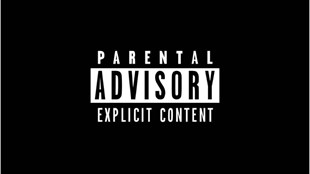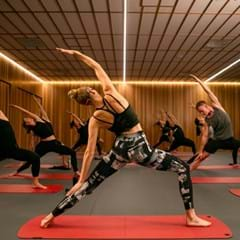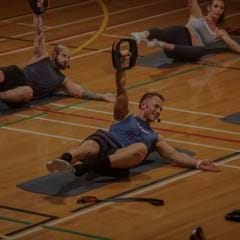You may not be aware, but we have a dedicated team of lyric-checkers who monitor every single song, in every single program, for words and themes that may cause offense. Based in the US, this team will recommend editing a comprehensive list including: profanity, domestic violence references, excessive repeated themes that are overly violent or sexual… the list goes on. If this is not possible for various reasons, we will try to provide an alternative (read our music article to find out more on this one!)
I DON’T LISTEN TO THE LYRICS
Jennifer Rinns Londre: Don’t listen to the lyrics unless they hit me in the face.
Stacy West Smith: I listen to the music itself more AND I never read too much into the lyrics… some are catchy to use but it’s minimal. I'm too busy coaching and getting my workout on.
Amela Cheng: I listen to the music and the beat. The only time I focus on the lyrics is when to cue the next move, but then it’s literally the one word that’s on the choreography notes.
Susan Green-Quigley: My husband and I are both musicians. He's a guitar player/singer, I'm the singer/rhythm guitar player. That said, he focuses naturally on chord progression and guitar riffs. Me? Lyrics, intonation, delivery. Some lyrics hit me right upside the back of my head and I'm like, seriously people? My husband? Never heard it.
Jennifer Higdon: I honestly hardly ever pay attention to the lyrics, as an Instructor or when I was a participant. It was the feel and intensity of the music that always drove me. Still does.
Veronica Renteria Peloquin: I don't really listen to the lyrics, I just listen to the music. The only time I look up the lyrics to a song is so I can sing along with it without sounding like an idiot by saying the wrong words. I typically only use alternate tracks when I like them better than the originals.
IT DEPENDS ON THE CONTEXT
Gandalf Archer Mills: I think if a song isn’t hurting anybody – you know, it’s not inciting hatred or misogyny or racism, like, all the horrible things that we as a society over the last couple of hundred years are desperately trying to get rid of – then I’m OK with it. Things aren’t black or white and you have to take the context into account – the history of the artist and who they are as a person and what message they’re trying to convey. If you read Kendrick lyrics on a piece of paper, a lot of people are like “no, no I don’t want this and YOU can’t listen to this”, like, deciding for someone else what they get to listen to. And then you hear Kendrick in a song and it’s beautiful and clever and smart and possibly teaches you things about a world that doesn’t affect you in the slightest. It’s educational and breaks down barriers, and that’s what music can do – it educates.
I USE THE ALTERNATIVE TRACKS
Christopher Schouten: A great diversity of music is one of the key strengths of Les Mills’ programs and my participants and I love it! When I get a new release, I study both the music and the lyrics so I can really connect with them and bring them to life in my classes. I often combine the lyrics with my cues – and yes, I sing them off key! If there is a song that has lyrics that doesn't represent the values of myself or my participants (especially if it’s disrespectful to certain groups like women), then I skip it and use the alternative track or an old release. It doesn’t happen very often, but I don’t think some recent songs represent either my brand or the Les Mills brand, so I avoid them.
Jessica Lusk: I teach to the music. I can always find something to like about every song. But lyrics do matter. And occasionally I use the alternate track. Recently I used the alternate in BODYPUMP™ for biceps because of the song subject. And I will use the alternate for the core track this round, because I am uncomfortable listening to/practicing “Taki Taki” in front of my kids. The lyrics are nasty and very clear to hear.
Jackie Miller: I teach BODYCOMBAT™ and BODYPUMP and I really appreciate having alternative tracks. It gives me more resources to be able to teach and provide variety for my classes. And lyrics… often times I don’t really hear them but if they say something truly abhorrent (like encourage rape culture or something like that) I would not want to use them. Otherwise if it’s got a great beat I don’t care.
Rose Ann: I was certified on Release 74 and the only time I have ever had a concern about lyrics in a song has been for Track 6 for BODYPUMP Release 109, Shadowboxer. In my opinion, that situation was very different than having a "bad" word in the song. The lyrics "alone inside... I wish that I could die" are clearly repeated over and over and the overarching theme of that song was pretty troubling. There is a regular member in my classes that has a semicolon tattoo (suicide survivor) and I was beside myself that those words might be triggering or cause them to avoid my class. We never know what issues people are trying to escape at the gym and I'm sure it's not just one person in that room. I think it was a poor song choice, but I can see how it might be easy to overlook something like that. Some Instructors were fine with it and tried to spin it in some other way, but why would be even take the chance that someone can be hurt by a song in a workout? I was surprised that there was no alternate track and I am thankful that we did eventually receive an alternate, but my launch date was long gone by then.
I LOVE THE LYRICS
Heather Daniels: The dirtier the lyrics the better as far as I’m concerned. I love inappropriate songs. It makes me feel like I’m forced to come up with cues to cover them up for people who might find them offensive!
Laura Warner Rumfelt: Love the lyrics! I am always so impressed with how Les Mills is able to find songs with lyrics that pertain to the goals we as well as our participants set in fitness. I use the heck out of those lyrics with my cuing.
Julie Sparks: I do not use the alternate tracks as I listen more to the beat rather than focus on the lyrics. Sure I occasionally sing along but I choose which parts to do so. Whenever I have brought up that some people have been offended by a song, EVERY member has told me they do not listen to the lyrics. Matter of fact, they ALL love Boom. The beat is strong and ties in well with the moves. Keep doing what you are doing! People keep coming back for more!
Sheryl Dagostino: I am not offended by lyrics in songs. I actually enjoy expression through language and see the music for what it is – ART! I really like the music used in BODYPUMP, there is enough variety in style and tempo to keep anyone distracted from lyrics. Nobody has ever complained in my classes about lyrics – EVER.
Denisse Westbrook: I’m never offended by the lyrics... often times I don’t really hear the lyrics until I start teaching.
Neda Kayyali: I love a sing-song release so I do hear the lyrics but I’m not easily offended and have never experienced any negativity towards the music or lyrics in my classes. I think it’s more about the beat and the moves though – our participants want a fun, tough, functional workout. I have never used or felt the need to use the alternate tracks.
MY MEMBERS DON’T SPEAK ENGLISH
Marina Abrahams: My members are easy-going and many don't speak English as a first language, so “controversial" song usage has never been an issue.
Victor Fernández: I'm from Barcelona. I must admit that I was surprised when I realized how much discussion of lyrics arises on Facebook. In the gym where I work, Instructors rarely use alternative tracks. We like to focus much more on the workout, connection on every class... Here in Barcelona, people who are in their mid-40's and older don't speak English or speak it in a basic level so most times they don't understand the lyrics of most of the songs. Younger people are more fluent and understand the lyrics but I've never had a complaint about specific lyrics. Not even a complaint from my participants who are native English speakers. When it comes to songs which are sung in Spanish it’s more of the same. We may feel a bit uncomfortable with some reggaeton [A Puerto Rican musical style] lyrics but I think this is mostly because reggaeton is either loved or hated in this little corner of the World. I don't think that in South America they feel the same, for instance. And that is OK.
I TEACH AT CONSERVATIVE FACILITIES
Nina Marie Anderson: I love the music but I work at the YMCA and sometimes I’m told not to teach some tracks. BODYPUMP 108, Make It Rain, was that... I LOVE that song but was told to not teach it. I play Boom sometimes but some members will give me dirty looks and I can’t play it again. I never played the 109 Bicep track Shadowboxer again after launch. It was a personal decision I made because although the workout is AMAZING, I think it sends the wrong message. I want to lift people up and push them to do great things in my class. I can’t play a song that sends the opposite message.
Julie Francis: Lyrics in general don’t offend me unless there’s an overtly racist theme. I love knowing the lyrics because it helps me connect with a song. However, I teach at a conservative place with children everywhere. While I think Boom is the best back track song EVER, I can’t use it. I wish Boom had been edited to keep the beat and lose the cussing. To me it’s more about our members and how they feel. If there’s a risk in offending them and losing their commitment to the class, it’s not really worth it. It’s easy enough to edit the lyrics.
Carole Walter Jones: I teach three formats at a YMCA so the lyrics are extremely important to our members. While they do not offend me personally, I respect those that they might offend others. I don't use the alternative tracks because as an Instructor, I feel they are a "lesser" option and don't have the same feel as the original. I always prefer songs that have lyrics to instrumental versions, because I like to play with my coaching around them.
Karin Speicher: I like a variety of topics in my songs but since I work for two Christian Fitness facilities I always have to use the alternate tracks. The big problems are curse words. If it’s one or two I can coach loudly to cover it but when it’s pervasive there is no chance I can use that song. The recent song about suicide is just not uplifting in the class setting. Although it allowed me to talk with my teenage boys about the topic it wasn’t a good choice for a group fitness class in my opinion.
Lindsey Longmire Myers: I absolutely listen to lyrics! I don’t get too caught up in them but there were a couple of songs in the last couple of years I felt a bit awkward teaching to some of the more conservative members. I LOVE a good hip hop track but not when I’m stressed cuing over lyrics!
Rebecca Wooten Norris: My gym is owned by a Christian organization so I often use the alternates. I don’t mind using them (love the ab track Love Runs Out or Southpaw, the alt to Shadowboxer). I sometimes feel frustrated when I’m not given an alt (Pyramids in BODYBALANCE™/BODYFLOW® 85 for example) or if the alt is just the same track minus lyrics (108 comes to mind).
Krystle Agans: Our YMCA limits the tracks we use because of lyrics. Tough, because I typically like them over the alternative tracks but we respect our members/fitness community.
Carrie Knight: One day I got in the car and a song was playing from what sounded like the 1920s or 30s. It had that old, scratchy recording quality, and the lyrics asked a cloud to float away so it didn’t rain on the singer’s picnic. The innocence of these lyrics from a bygone era made me both chuckle and take pause about how drastically times have changed.
Song lyrics are often a hot button issue for instructors on social media. As a BODYBALANCE/BODYFLOW, BODYPUMP, and LES MILLS BARRE™ teacher who works at a YMCA, I rely on alternate tracks for songs that may be “too much” for members. Do I always use the alternate tracks? To be honest, no. But seeing them in the playlist alerts me that the “regular” songs will need investigation before playing them in class.
Sometimes we decide as a program team to use the alternates. A recent example was the song Boom from BODYPUMP 107. After listening to the lyrics, our BODYPUMP team (and manager) said no to BOOM and instead used the similar sounding alternate, I Bet You Wanna.
On the flip side was the original Track 5 for BODYFLOW Release 83, Two Weeks. We stuck with this one because our members didn’t previously know this song and the lyrics were difficult to distinguish in a class setting. I actually thought the words were “open your heart” until a Google search of the original lyrics revealed otherwise. The vibe of that song was unique and offered great contrast to the tracks before and after it, so we used it.
Years ago when BODYFLOW 57 was released, I worked for a hospital-based fitness brand that was also very family oriented. I remember discussions about the Beyoncé song, The Best You Never Had. A fellow Instructor knew the lyrics “sucks to be you right now” wouldn’t fly with her Tuesday morning members so she substituted a different Track 3. However, I knew my Friday crew would be fine with it and we actually had fun playing with the lyrics.
For me, selecting which songs are best for the class is quite simple. It boils down to knowing the members and the mission of the organization/club, and treating everyone who walks through the door with respect and care. My goal is for members to leave class feeling so fantastic about their workout experience they can’t wait to return (and bring friends!).
Music is at the core of Les Mills programs. The songs, well-crafted choreography, and a love for yoga drew me to BODYFLOW 10 years ago. It’s reassuring to know Les Mills offers alternate tracks so we Instructors can thoughtfully cater to our members.
You can always share your feedback on lyrics at instructor@lesmills.com







